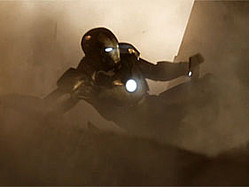"Iron Man 3," the movie you and everyone you know probably saw over the weekend, brings one of Tony Stark's oldest foes to the big screen for the first time. The Mandarin, played in "Iron Man 3" by Sir Ben Kingsley, has been around nearly as long as his superhero rival, making his first appearance in 1964's "Tales of Suspense #50."
SPOILERS AHEAD
Now, if you've seen "Iron Man 3," you know that the cinematic debut of the iconic villain doesn't quite live up to his storied comic-book legacy. Kingsley's portrayal of the Mandarin essentially discredits the villain, revealing him to be nothing more than a terrorist figurehead played by a bum actor named Trevor Slattery.
The twist makes for one of the film's biggest surprises and funniest moments, but it also does something unprecedented for comic-book movies. Director Shane Black and his co-writer Drew Pearce undercut the legacy of one of Iron Man's most well-known villains and reveal him to be a fraud. We reached out Sean Howe, the author of "Marvel Comics: The Untold Story" to get his reaction to the Mandarin twist and how it makes sense considering the character's history.
The Mandarin's History
As Howe explained, during the 1960s, Marvel was highly reactionary to reader letters, so his longevity is probably a credit to his fans. "It was really kind of a weird pastiche of villain cliches. But if he kept returning, that meant that Marvel was getting a lot of letters from people who liked him," Howe said. "Marvel just didn't keep trying to ram stuff that kids weren't responding to down their throats. They were really test marketed."
Changing with the Times
"Iron Man 3" isn't the first story to toy with the Mandarin's origin, which drew him as the wronged son of nobility who found his ten rings of power. "The Mandarin has been revised over the years," Howe explained. "Like many superhero characters that have been around for 50 years, the creators have had multiple shots at trying to get it right." In 2010's "Invincible Iron Man Annual #1," it's revealed that the original story of the Mandarin's beginnings were creations of the man himself, who had actually been the son of a prostitute. Howe theorized that the shaky facts of the Mandarin's comic-book origin may have been the germ of the idea for the Trevor Slattery switch.
Keeping Things Interesting
Howe points out that deliberately turning away from faithfulness to a character's source material is one of the few ways to surprise audiences anymore. Unlike recent "surprises" like Talia Al Ghul in "The Dark Knight Rises" and the questionable fate of Emma Stone's Gwen Stacy in "The Amazing Spider-Man 2," the Mandarin's came as a genuine surprise to everyone. "I think to totally betray the comic book audience, on some level, is a fun way to keep it engaged, instead of watching every frame wondering how it compares to the comic book," Howe said. "All of the talk about spoilers in comic book movie, it's pretty unusual that comes along in a movie that makes people say, 'Whoa, I've never seen that before.' "
Check out everything we've got on "Iron Man 3."










